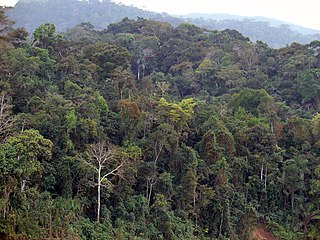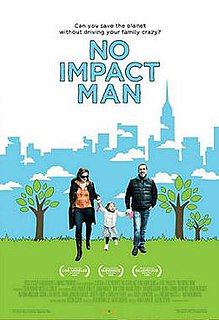Related Research Articles

Terraforming or terraformation is the hypothetical process of deliberately modifying the atmosphere, temperature, surface topography or ecology of a planet, moon, or other body to be similar to the environment of Earth to make it habitable by Earth-like life.

The biomass is the mass of living biological organisms in a given area or ecosystem at a given time. Biomass can refer to species biomass, which is the mass of one or more species, or to community biomass, which is the mass of all species in the community. It can include microorganisms, plants or animals. The mass can be expressed as the average mass per unit area, or as the total mass in the community.
Overconsumption describes a situation where the use of a renewable natural resource exceeds its capacity to regenerate. A prolonged pattern of overconsumption leads to the eventual loss of resource bases. The term overconsumption is quite controversial in use and does not necessarily have a single unifying definition. Overconsumption is driven several factors of the current global economy, including forces like consumerism, planned obsolescence, and other unsustainable business models and can be contrasted with sustainable consumption.

Simple living refers to practices that promote simplicity in one's lifestyle. Common practices of simple living include reducing the number of possessions one owns, depending less on technology and services, and spending less money. These practices can be seen throughout history, religion, art, and economics.

Biosphere 2 is an American Earth system science research facility located in Oracle, Arizona. Its mission is to serve as a center for research, outreach, teaching, and lifelong learning about Earth, its living systems, and its place in the universe. It is a 3.14-acre (1.27-hectare) structure originally built to be an artificial, materially closed ecological system, or vivarium. It remains the largest closed ecological system ever created.
Sustainable living describes a lifestyle that attempts to reduce the use of Earth's natural resources by an individual or society. It is often called "earth harmony living" or "net zero living". Its practitioners often attempt to reduce their ecological footprint by altering their home designs and methods of transportation, energy consumption and diet. Its proponents aim to conduct their lives in ways that are consistent with sustainability, naturally balanced, and respectful of humanity's symbiotic relationship with the Earth's natural ecology. The practice and general philosophy of ecological living closely follows the overall principles of sustainable development.

The Gaia hypothesis, also known as the Gaia theory, Gaia paradigm, or the Gaia principle, proposes that living organisms interact with their inorganic surroundings on Earth to form a synergistic and self-regulating, complex system that helps to maintain and perpetuate the conditions for life on the planet.

The ecological footprint is a method promoted by the Global Footprint Network to measure human demand on natural capital, i.e. the quantity of nature it takes to support people or an economy. It tracks this demand through an ecological accounting system. The accounts contrast the biologically productive area people use for their consumption to the biologically productive area available within a region or the world. In short, it is a measure of human impact on the environment.

A carbon footprint is the total greenhouse gas (GHG) emissions caused by an individual, event, organization, service, place or product, expressed as carbon dioxide equivalent (CO2e). Greenhouse gases, including the carbon-containing gases carbon dioxide and methane, can be emitted through the burning of fossil fuels, land clearance and the production and consumption of food, manufactured goods, materials, wood, roads, buildings, transportation and other services.

Tyler Volk is a professor in the departments of environmental studies and biology at New York University.
The ethics of terraforming has constituted a philosophical debate within biology, ecology, and environmental ethics as to whether terraforming other worlds is an ethical endeavor.

A global warming game, also known as a climate game or a climate change game, is a type of serious game. As a serious game, it attempts to simulate and explore real life issues to educate players through an interactive experience. The issues particular to a global warming video game are usually energy efficiency and the implementation of green technology as ways to reduce greenhouse gas emissions and thus counteract global warming. Global warming games include traditional board games, video games, and other varieties such as role-playing and simulation-assisted multiplayer games.

Sustainability is a societal goal with three dimensions : the environmental, economic and social dimension. This concept can be used to guide decisions at the global, national and at the individual consumer level. A related concept is that of sustainable development. Both terms are often used synonymously. UNESCO formulated a distinction as follows: "Sustainability is often thought of as a long-term goal, while sustainable development refers to the many processes and pathways to achieve it."

A water footprint shows the extent of water use in relation to consumption by people. The water footprint of an individual, community, or business is defined as the total volume of fresh water used to produce the goods and services consumed by the individual or community or produced by the business. Water use is measured in water volume consumed (evaporated) and/or polluted per unit of time. A water footprint can be calculated for any well-defined group of consumers or producers, for a single process or for any product or service.

The natural environment, commonly referred to simply as the environment, includes all living and non-living things occurring naturally on Earth.

Environmental issues are effects of human activity on the biophysical environment, most often of which are harmful effects that cause environmental degradation. Environmental protection is a practice of protecting the natural environment on the individual, organizational or governmental levels, for the benefit of both the environment and humans. Environmentalism, a social and environmental movement, addresses environmental issues through advocacy, legislation education and activism.

No Impact Man is a 2009 American documentary film directed by Laura Gabbert and Justin Schein, based on the book by Colin Beavan. The film, which premiered September 4, 2009, follows Colin Beavan and his family during their year-long experiment to have zero impact on the environment. The film mostly takes place in New York City.
Biocentrism, in a political and ecological sense, as well as literally, is an ethical point of view that extends inherent value to all living things. It is an understanding of how the earth works, particularly as it relates to its biosphere or biodiversity. It stands in contrast to anthropocentrism, which centers on the value of humans. The related ecocentrism extends inherent value to the whole of nature.

Conservation photography is the active use of the photographic process and its products, within the parameters of photojournalism, to advocate for conservation outcomes.

Individual action on climate change can include personal choices in many areas, such as diet, means of long- and short-distance travel, household energy use, consumption of goods and services, and family size. Individuals can also engage in local and political advocacy around issues of climate change. As of 2020, emissions budgets are uncertain but estimates of the annual average carbon footprint per person required to meet the target of limiting global warming to 2 degrees by 2100 are all below the world average of about 5 tonnes CO2-equivalent. And to meet 1.5 degrees 2.3 tonnes annual average is required by 2030. According to 66% of respondents to an EU climate survey, climate change will still be a severe concern by 2050.
References
- ↑ Miller, Jr., G. Tyler Living in the Environment CA: Wadsworth Publishing Co, 1975
- ↑ Cook, Stephen P. and Meadows, Donella H. Coming of Age in the Global Village AR: Parthenon Books, 1990
- ↑ Cook, Stephen P. Choices We Make in the Global Village AZ: Parthenon Books, 2022